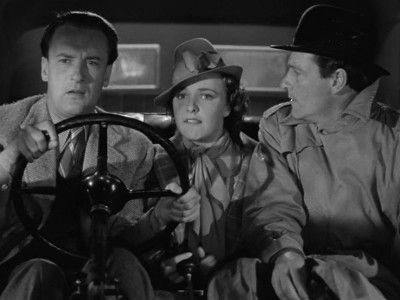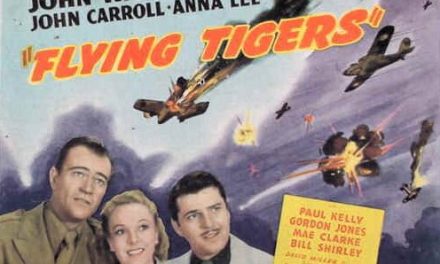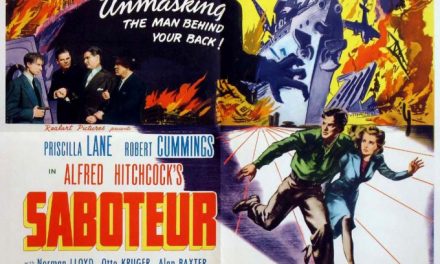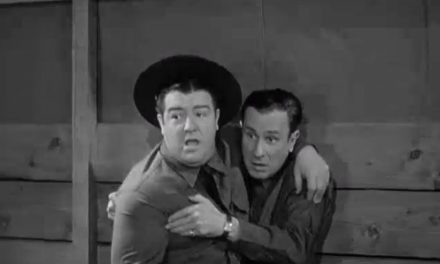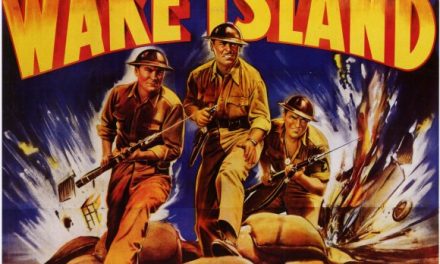In his best film to date, Alfred Hitchcock brings to life the story of an American journalist sent to Europe. Foreign Correspondent intertwines the real-life fear of war with a thrilling tale of conspiracy. This movie, while touching upon the war raging around us, is able to transport you into a fictional world, one that captivates and entertains you.
The film starts in 1939, just before the onset of the current world war, at the fictional New York Globe. The editor, Mr. Powers, is frustrated by the lack of information he is receiving on the impending crisis in Europe. As a solution, he decides to send reporter Johnny Jones (under the pseudonym Huntley Haverstock) to Europe to become the new foreign correspondent. He is assigned to cover the leader of the Universal Peace Party, Stephen Fisher, and ends up befriending Fisher’s daughter, Carol, and a Dutch diplomat, Van Meer. What starts out as a seemingly slow movie about politics and reporting then takes a drastic turn.
When Jones is sent to a political conference in Amsterdam, he runs into a friendly face – Van Meer. The reunion is not a happy one, however, because Jones witnesses Van Meer getting shot. In an attempt to bring the man who killed his friend to justice, Jones (along with Carol Fisher and her friend Scott Ffolliott) chases after him to an abandoned windmill. While inspecting the windmill, Jones comes across not only the man who supposedly killed Van Meer, but Van Meer himself . . . alive. Jones then brings the police back to the windmill, but no one is there.
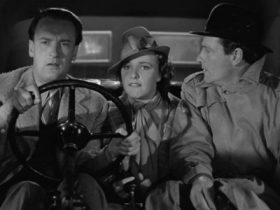
George Sanders, Laraine Day and Joel McCrea in Foreign Correspondent. From Wikimedia Commons.
Later on, two spies disguised as police officers show up at Jones’s hotel room in an attempt to kidnap him, only Jones figures it out and escapes through the bathroom window. He and Carol take a boat back to England, where Jones confesses his love for her and proposes, which she accepts. When they arrive at England, they go to Carol’s father’s house. Feigning concern for the life of his daughter’s fiancé, Mr. Fisher assigns Jones a bodyguard – but the bodyguard was actually instructed to kill him.
When the bodyguard’s failed attempt at murder gets him killed instead, Jones and Ffolliott are convinced that Mr. Fisher is a traitor and come up with a plan to kidnap Carol in order to force Mr. Fisher to cooperate.
Jones and Ffolliott arrive at a hotel where Van Meer is being interrogated about a secret clause in a treaty Van Meer had signed. Jones and Ffolliott manage to rescue him, though he is hospitalized. After England and France declare war on Germany, Jones and Ffolliott board the same plane as Mr. Fisher and his daughter. Mr. Fisher confesses his role in the entire affair to Carol, and seconds after, the plane is shot down by the Germans. The survivors try to stay afloat on the wing of the plane, but there are too many, so Mr. Fisher sacrifices himself for the life of his daughter. When rescue finally arrives, Jones gets all the information back to the New York Globe.
Filled with just the right amount of action, suspense and emotion, Foreign Correspondent has all the requirements to become one of the classics. We are caught in the middle of one of the biggest conflicts, one ranging across several continents. Fear of a Nazi or Japanese takeover is evident, especially with their continuous expansion. More territory is falling into the hands of the enemy. It is hard to constantly remain optimistic.
The main premise of the film centers on The Second World War. The difference between Foreign Correspondent and other movies about the war is that Hitchcock finds a way to incorporate a fictional story into a nonfictional setting in a way that makes you feel as if the war is not our reality. Instead, it is all happening only to the characters within this story that Hitchcock has created. Instead of reminding the viewers about the reality we are all facing, Foreign Correspondent allows them to escape. The excellent acting and artistic way the story unfolds captivates the audience, while the thrilling events have everyone on the edge of their seats.
To say this is a great movie is an understatement. Hitchcock created a masterpiece by weaving together reality and the imaginary. If you want to see a movie that challenges the way you think, while simultaneously entertaining and shocking you, go see Alfred Hitchcock’s Foreign Correspondent. It does not disappoint.

